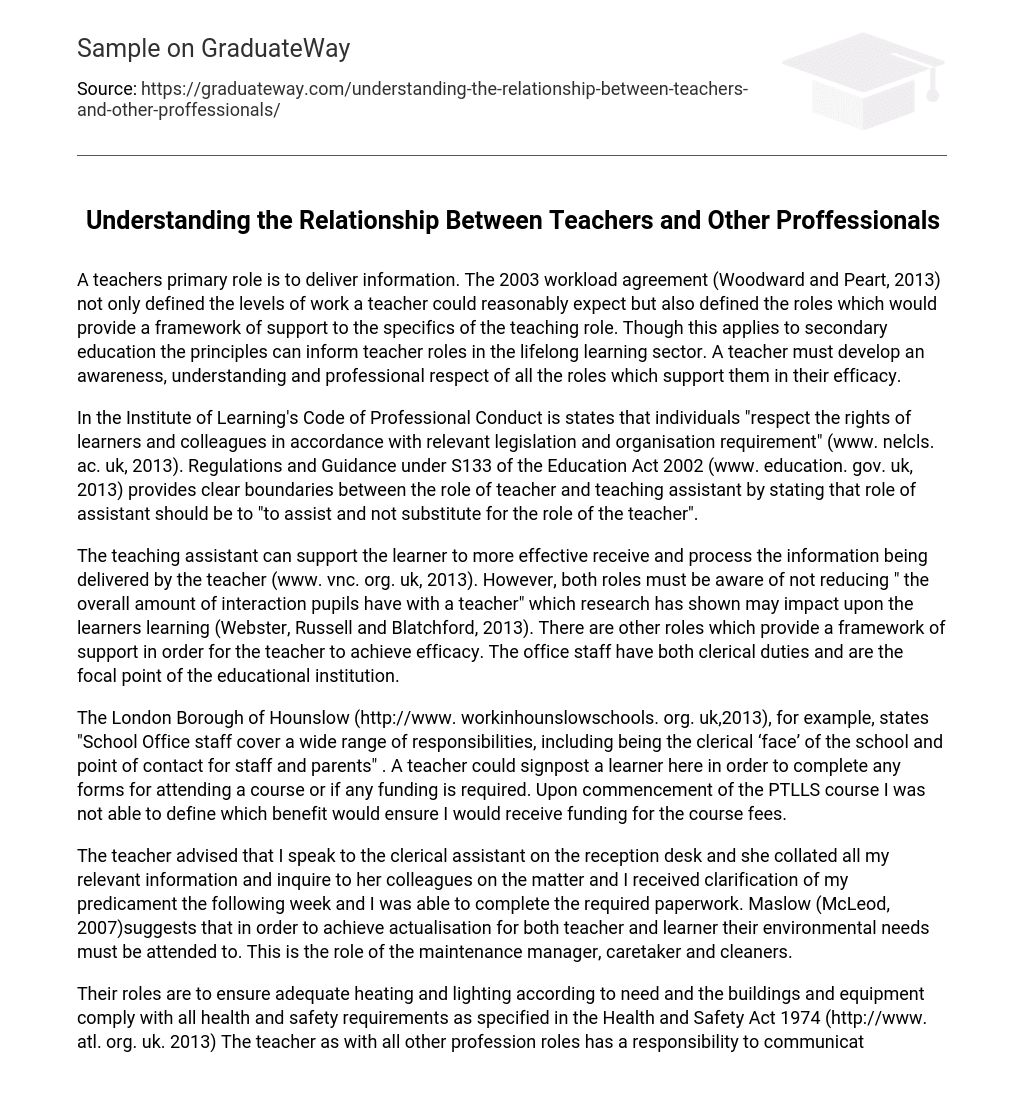The main responsibility of a teacher is to impart knowledge to students. The 2003 workload agreement (Woodward and Peart, 2013) not only established the acceptable workload for teachers but also outlined the different roles that offer support within the teaching profession. While this agreement primarily applies to secondary education, it can also serve as guidance for teacher roles in the lifelong learning sector. Therefore, teachers should recognize, comprehend, and appreciate all the supporting roles that contribute to their effectiveness.
The Institute of Learning’s Code of Professional Conduct mandates individuals to “respect the rights of learners and colleagues in accordance with relevant legislation and organization requirements” (www.nelcls.ac.uk, 2013). Under S133 of the Education Act 2002 (www.education.gov.uk, 2013), Regulations and Guidance establish distinct boundaries between the roles of a teacher and a teaching assistant, emphasizing that the assistant’s role is to support rather than replace the teacher.
Both the teaching assistant and the teacher must be aware of not reducing the overall amount of interaction pupils have with a teacher, as research has shown this may impact upon the learners learning (Webster, Russell and Blatchford, 2013). The teaching assistant can support the learner to more effectively receive and process the information being delivered by the teacher (www.vnc.org.uk, 2013). There are other roles within the educational institution that provide a framework of support, such as the office staff who have both clerical duties and serve as the focal point.
The London Borough of Hounslow (http://www.workinhounslowschools.org.uk,2013) states that school office staff have various responsibilities, including being the clerical ‘face’ of the school and the point of contact for staff and parents. If a learner needs help with completing forms for attending a course or requires funding, a teacher could direct them to the school office. When I started the PTLLS course, I was unsure which benefit would make me eligible for course fee funding.
The teacher told me to talk to the reception desk clerical assistant. The assistant gathered all my relevant information and spoke to her colleagues about my issue. The following week, I received clarification about my problem and was able to finish the necessary paperwork. Maslow (McLeod, 2007) suggests that meeting environmental needs is crucial for both the teacher and student to achieve self-actualization. This responsibility falls on the maintenance manager, caretaker, and cleaners.
The roles of individuals in educational institutions, such as teachers and information technology technicians, are crucial for ensuring proper heating and lighting as required by the Health and Safety Act 1974 (http://www.atl.org.uk. 2013). Additionally, these individuals have a responsibility to effectively communicate their needs and ensure that all equipment and buildings are used appropriately and with care. The Department of Education emphasizes that employees should adhere to any health and safety procedures implemented by their employer (http://media.education.gov.uk, 2013). In certain cases, specialized roles may exist, such as that of the information technology technician. I personally experienced the helpfulness of this role when I encountered difficulties accessing necessary files for my first assignment from home. My teacher introduced me to the information technology technician, who, with their knowledge and support from peers, helped me resolve the issue and continue my studies, ultimately allowing me to complete the assignment.
Teachers need to be aware of their responsibilities towards learners, as stated by www.sagepub.com (2013). This involves directing them to professionals who are trained and designated to assist with their specific challenges. Learners may encounter different obstacles that can hinder their academic advancement.
Having knowledge of different support systems is crucial for effectively assisting individuals. If someone is experiencing mental health problems, they can seek help from their doctor or a counselor associated with their educational institution. Likewise, if a teacher suspects any learning challenges, they can discuss their concerns with the student and direct them to the appropriate specialist for diagnosis and assistance. During my English A level studies, my teacher noticed indications of mild dyslexia in me and recommended that I consult student support services for testing to get an accurate diagnosis and suitable support.





